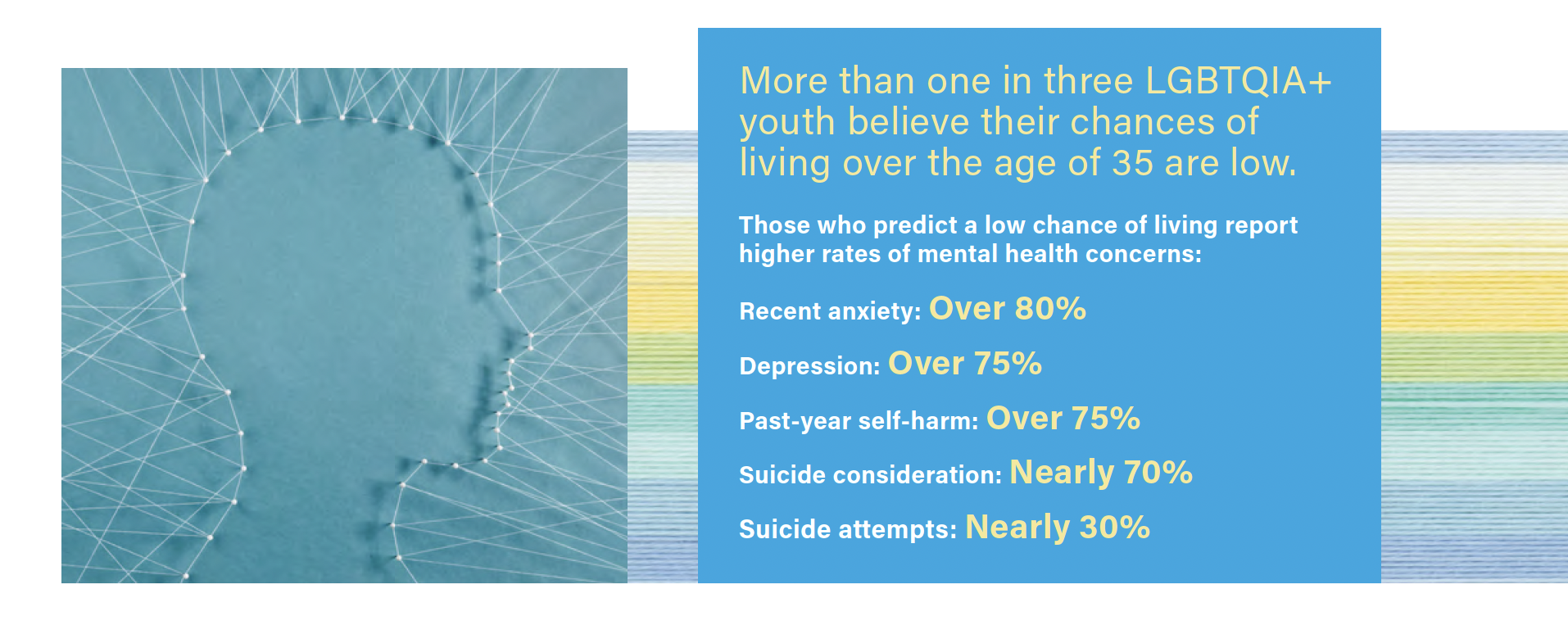By Courtney Mullins and Nikki Brahm, originally published in Insight into Diversity
For Queer, Trans and Gender Non-Conforming students, college communities must move beyond acceptance to authentic, systemic inclusion
College campuses strive for inclusivity and support for Queer and Gender Non-Conforming mental health is an imperative aspect for a truly thriving educational environment. Yet, many studies highlight startling realities. For example, among a sample of more than 28,000 queer young people, over one in three believe their chances of living over the age of 35 are low, according to the 2024 study “Perceived Life Expectancy and Life Purpose in LGBTQ+ Young People” by The Trevor Project.
This belief correlates with increased mental health concerns; those who predicted a low chance of living a long life reported higher rates of recent anxiety, depression, past-year self-harm, suicide consideration and suicide attempts.

As the data makes clear the urgent need for action, Genny Beemyn, PhD, director of the Stonewall Center at the University of Massachusetts Amherst, said students are finding their voice. Beemyn has published extensively on the experiences and needs of Transgender college students.
“There are more students recognizing that they need help and seeking help...,” said Beemyn. “I think [it’s] a positive change that people who are experiencing harassment and discrimination aren’t just sitting on it and letting that impact them in negative ways, but are [finding help].”
Experts have said the campus community can implement a number of actions to prioritize the psychological wellbeing of Queer and Gender Non-Conforming students, including integrating diversity, equity, and inclusion (DEI) efforts with mental health support. There's a strong correlation between “discrimination and increased general distress, social isolation, and suicidal thoughts,” stated the Center for Collegiate Mental Health in their 2023 annual report, which accounts for more than 185,000 college students who sought mental health treatment at 195 campus counseling centers during the 2022-2023 academic year.
While it’s no secret that a sense of belonging contributes to mental wellbeing, stigma around mental health coupled with attacks on diversity programming and LGBTQIA2S+ rights and policies contribute to overlooking this critical component.
“We can’t expect students to be able to fully be present and learn the course content if we’re not allowing them to show up in spaces as their authentic selves,” said Jon Humiston, EdD, director of noncredit and alternate enrollment programs for innovation and online at Central Michigan University. “Maslow’s hierarchy of needs will say if your basic needs aren’t met, your ability to grasp and focus on external content like learning course material is going to be much more challenging.”
Spanning two decades, Humiston’s career and research has focused primarily on the campus climate for Queer, Trans and Gender Non-Conforming students.
In the current climate, it is increasingly important that an abundance of resources are available to offer much-needed support, such as drop-in counseling, transportation services for on- or off-campus healthcare, telehealth and virtual offerings. It’s also vital that institutions advance inclusive environments, centers, housing options, organizations, programming and systems to accurately identify student names, pronouns and gender identification.
“Trans and Nonbinary students need places where they can have support, where they can be themselves and live their lives as themselves,” said Beemyn. “Too often that doesn’t translate in the campus environment.”
Overall, because the quality of psychological health is so closely linked with the depth of social connection, every aspect of a campus should nurture a sense of community.

Queer, Trans, Gender Non-Conforming and other marginalized populations report lower rates of perception about their professors' support, but students who do feel cared for are 30% less likely to attempt suicide, as indicated in The Trevor Project study, “The Relationship Between Caring Teachers and the Mental Health of LGBTQ Students.”
In a vicious cycle, untrained faculty and staff attempting to support students in crisis are less likely to have the appropriate resources for them and more likely to need support themselves. Restrictions on mandatory training for faculty and staff exacerbate these circumstances. In some places, leaders and administrators may be penalized for even encouraging such training.
Institutions can prioritize education for students and educators alike by partnering with community organizations, distributing educational literature, or offering voluntary educational hours through LGBTQIA+ centers. Not only does guidance need to be offered to faculty and staff, but educators must also take the initiative to educate themselves, said Beemyn.
Overall, students need to know that there are individuals available, on campus and beyond, who are eager to offer assistance," said Beemyn. “There’s so much support in the world...people who are there for you or who would be there for you. You just need to find those people.”
Read the original article here.
Courtney Mullins is staff writer at Insight Into Diversity who is pursuing an MA in Rhetoric and Composition at Appalachian State University. Nikki Brham is a senior staff writer at Insight into Diversity covering stories on diversity, equity and inclusion topics.


